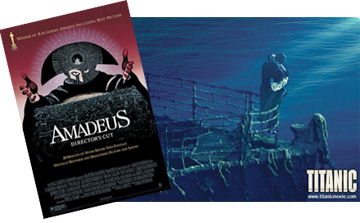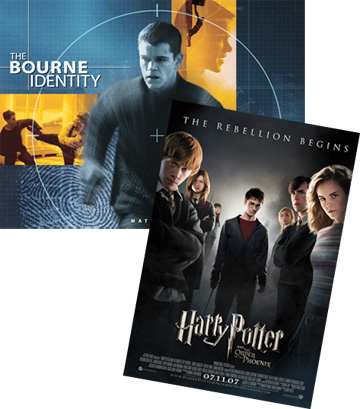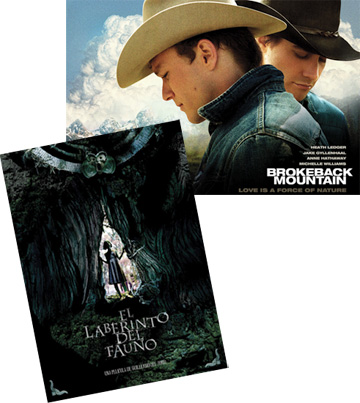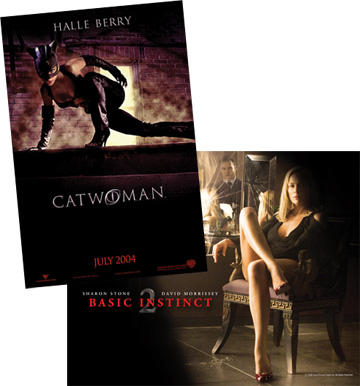Volume 25 · Number 2 · Winter 2008
Let's Make a Movie
Just what does it take to make an award-winning movie or one that makes it big at the box office? Few people know better than Dean Simonton, a professor of psychology and an expert on human creativity.
Simonton has subjected thousands of feature-length, English-language, narrative films to a battery of statistical tests — including mind-boggling Pearson product-moment coefficients and hierarchical regression analyses — to get at the formulas for cinematic success (and failure).
“Exceptional creativity is frequently viewed as a highly individualistic phenomenon,” he says. “But there is at least one type of artistic expression that is extremely prominent, often highly profitable and inherently collective in nature: the feature film. Motion pictures provide a valuable research site for investigating group artistic creativity under real-world conditions.”
The author of Origins of Genius: Darwinian Perspectives on Creativity, Simonton is now at work on a new book, Great Flicks: Scientific Studies of Cinematic Creativity and Aesthetics.
Here’s his advice for all you would-be producers.

How to make a film that wins major awards
Do’s:
- Do an adaptation of a novel or nonfiction work rather than an original screenplay (serious stuff).
- Do a true story or biopic (even more serious).
- Do a serious drama or at least a great romance (more and more serious).
- Do aim at an R rating and avoid the G rating like the plague (seriousness piled upon seriousness).
- Do hire top-notch directors, actors/actresses and film editors (now let’s get really serious).
- Do hire, as well, excellent cinematographers, production designers, technicians and composers (voters are impressed by films that have everything a film can offer — the complete package): think classics like Lawrence of Arabia.
- Do release in the final months of the year (when the nominations accumulate and the ballots circulate).
- Do give the movie a long run time (hours of seriousness).
- Do cross your fingers and hope for a little luck (at the last minute Clint Eastwood may come out with a new flick, or the buzz may bring up a dark horse, like Crash).
Don’ts:
- Don’t do a remake or sequel.
- Don’t worry about production costs (because budget doesn’t matter either way). For mainstream films the correlation between the major film awards and budget is almost exactly zero (indies are a little different because some can be made on a shoestring budget and suffer the consequence). Robert Rodriguez’s 1992 El Mariachi, which he made for $7,000, scored much higher with the critics than did his 1995 Desperado, which cost $7 million and had some superstars — money can’t buy love!

How to make a box office hit
Do’s:
- Do a sequel or a remake (ready-made audience). How about another Titanic?
- Do spend lots of money on production (you need money to make money). Besides, it’s part of the marketing to boast how much money was spent — like the extravaganzas of old Hollywood.
- Do hire top-notch technicians to do the overwhelming special effects and sound mixing (why else go to a movie theatre?). Include lots of explosions and computer-generated images.
- Do give the movie a long runtime (haven’t we heard this before? Moviegoers, like the critics, want their money’s worth).
- Do keep the rating at PG-13 or even PG (the longer the theatre lines the better). Can you imagine the next installment of Harry Potter being R-rated?
- Do open on thousands of screens (duh!). You make megabucks even if the film flops (especially if you’re smart enough not to prescreen the disaster for the critics).
- Do open in the summer (when the kids are on vacation and bored silly; they’ll even see a bad film more than once).
- Do cross your fingers and hope for a little luck (sorry, Charlie, but your movie might open against a true blockbuster).
Don’ts:
- Don’t let the director get involved in writing the screenplay (he/she might get too artistic; stick to the job description). The director should just be a technician, expert at working within budget.
- Don’t make a serious drama (who wants to go home crying or depressed?) Think of all the teen and family films, chick flicks and other feel-good films. Remember the 2002 My Big Fat Greek Wedding? Grossed $241 million!
- Don’t make an R-rated movie and certainly no NC-17s (just think of all the teens stopped at the entrance). This is particularly crucial since the ratings have become increasingly enforced.
- Don’t do a true story or biopic (who cares anyway? Once more, too serious, like some history lesson).
- Don’t adapt from a play, not even a Broadway hit (what happens in the theatre should stay in the theatre).
- Don’t let the original author write the screenplay if it is an adaptation (he/she might insist on fidelity to the original artistic vision, which may not be very marketable, like a sad ending instead of a happy ending).

Film as art form: How to make a critically acclaimed film
Do’s:
- Do use an adapted rather than original screenplay (the best ideas are already in plays and novels, and besides most screenwriters are hacks). Think Jane Austin, Shakespeare, Dickens, Hardy.
- Do base on a classic work that, if possible, recounts a true story (let’s find out how it really happened before our very eyes).
- Do make a serious drama (tragedy always surpasses comedy or romance as art). Just look at the ancient Greeks: Who’s more famous, Euripides or Aristophanes?
- Do aim at an R rating (sex and violence, but serious rather than gratuitous — like Brokeback Mountain).
- Do hire top-notch directors, actors/actresses and film editors (to accentuate the drama). This does not necessarily mean superstars, but well-known competent artists who have a good track record.
- Then do let the director get involved in writing the screenplay (for he/she’s got the big picture in mind) à la Bergman, Fellini, Herzog, Woody Allen.
- Do give the movie a long runtime (masterpieces are not short). If it’s less than 2 hours can it be serious? The shortest of the three Lord of the Rings films was 178 minutes, and the final one, that garnered all the awards, was 201 minutes!
- Do release during the last few months of the year, not during the summer. Everybody knows that the best films are saved for late in season when the nominations begin; films released too early are too soon forgotten (e.g., the 2003 Seabiscuit that was released in July)
- Do close your eyes, cross your fingers and hope for a little luck (what if Roger Ebert is in a bad mood?). Or it could be a matter of bad timing, like the 2006 Infamous coming out after the 2005 Capote.
Don’ts:
- Don’t do a sequel or remake (sure sign that the filmmaker lacks imagination). The Lord of the Rings trilogy doesn’t count because all three films were conceived together.
- Don’t make a musical (the form has all but died since the Golden Age of Hollywood). Dreamgirls and Chicago are very occasional exceptions, and these are almost invariably based on successful stage musicals.
- Don’t spend lots of money on production (foreigners know that less is more, so why can’t we?). Last year’s El Laberinto del fauno (Pan’s Labyrinth) cost less than $20 million to make and yet, according to Metacritic.com, was rated 98 out of 100 by U.S. critics. The average mainstream film costs about $40 million to produce.
- Don’t open on thousands of screens, but work your way around the art-house circuit painfully slowly. The 2004 Million Dollar Baby opened on just eight screens!

How to make a really terrible film
Do’s:
- Do a remake or sequel (the later in the sequence the better, like Jason X).
- Do spend lots of money on producing the film (but take care to spend it on all the wrong things, like special effects or overpriced stars who sleepwalk through their performances, like Battlefield Earth or Heaven’s Gate or Catwoman).
- Do make the movie’s runtime as short as possible (and spare the audience the full misery).
- Do release the movie on thousands of screens in the summer (so you can take your money and run).
Don’ts:
- Don’t use a screenplay that’s an adaptation and certainly not an adaptation of a prize-winning play (there can be no socially redeeming value to the product).
- Don’t let the original author (if you insist on doing the adaptation) have any involvement in adapting the play or novel (because that would maintain some degree of quality control).
- Don’t let the director have any say in the final screenplay (what does he/she know?).
- Don’t do a true story or biopic (that might make the film at least informative).
- Don’t do a serious drama (that might make the film at least worth thinking about).
- Don’t get an R rating (ditto).
- Don’t expect to make much money after the first weekend release (once the buzz circulates, the lines shrink to zero).
- Don’t bother to cross your fingers or hope for a little luck: You’ll be lucky to break even.)
